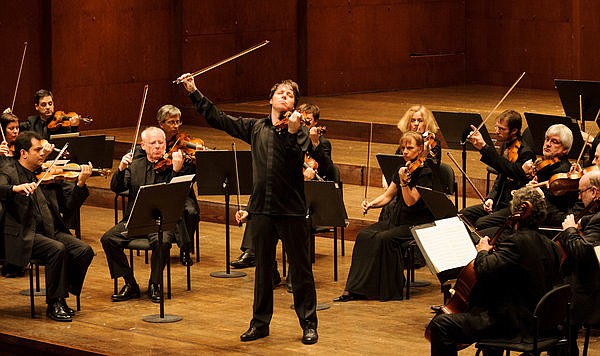- April 19, 2024
-
-
Loading

Loading

There is a difference between a conductor and a leader. For centuries, there were no conductors — not as we know them today, anyway. There were musicians — often composers — who stood in front of an ensemble with a huge, rod-like staff, pounding it on the ground in time to the music. Jean-Baptiste Lully, the famous 17th century French composer, died that way. In a moment of over-enthusiasm, he stabbed himself in the foot with his counting stick, gangrene set in and, a couple of months later, he was dead.
The world-renowned Academy of St. Martin in the Fields, a chamber orchestra founded almost 60 years ago by Sir Neville Marriner, is known as one of the finest “conductorless” orchestras in the world. Marriner, along with the esteemed violinist Iona Brown, usually led the group from the first chair (concertmaster’s seat), with a simple nod of the head, raise of the chin, full-body breath or signal with the bow.
A few years ago, Joshua Bell, the violin virtuoso, was named music director of the ASMF and, since that time, the ensemble and Bell have taken the group to an even higher superstar status among world-class chamber orchestras. Bell, something of a rock star in appearance and demeanor, is as much a showman as he is a violinist. His exaggerated gestures, while playing or leading, are both distracting and comical and, we’re sorry to say, he’s become a caricature of himself.
The Academy of St. Martin in the Fields, on the other hand, plays better than ever, in spite of the machinations Bell brings, either in front of them or from the piano bench he uses when he plays first chair.
Last week at the Van Wezel, ASMF brought a program of varied works, starting with the E major Violin Concerto by Bach, a work for strings. Bell led and soloed at such a brisk tempo any other ensemble would have fallen apart. Not so with the ASMF, whose members seem able to play at any speed with musicality and intelligence. Bell, for all his spastic maneuverings, plays like a god and, if you stop looking and simply listen, all is right with the world.
The ensemble's interpretation of the Beethoven Symphony No. 1 was one of the cleanest, freshest I’ve ever heard. Again, looking at Bell — this time seated as concertmaster and leader — was terribly distracting, and his cavorting almost ruined a great musical performance. Looking at him, one would never know his ensemble was playing with such incredible finesse because his awkward movements were crude, rough and disturbing. But the players were so engrossed and absorbed in making music, the results were mesmerizingly beautiful. Perhaps Bell is such a wonderful musician and colleague they’re able to take his mannerisms with a grain of British salt. But it was difficult for me not to be put off.
This is not to say Bell is not a great player. His performance in Saint-Saens’ “Introduction and Rondo Capriccioso” was nothing short of brilliant. He and the ASMF had wonderful elasticity of phrasing.
Best of all was their reading of Schubert’s D minor String Quartet (arranged by Mahler for string orchestra), “Death and the Maiden.” Here, Bell’s histrionics took a backseat to the music, and the results were spectacular.
I’m not usually fond of orchestral arrangements of chamber works. Mendelssohn’s famous Octet is, for me, much better when played by eight individuals than an entire string orchestra. In the same way, when Mahler arranged “Death and the Maiden” for larger forces, the music became thicker and more dense. But Bell and the academy clarified everything with a transparency of playing that was precise, sheer and extremely beautiful in sound and intention. The second movement, which is based on Schubert’s famous song of the same name, was played with such translucency, it was like coming out of a forest and finding sunlight.
The Academy of St. Martin in the Fields is a magnificent ensemble. Everything it touched last week turned to gold. Bell is still a rock star, and there’s no doubting his musicality or musical intentions. But his eccentricities are starting to overshadow his virtuosity, and it would be a shame if he were to allow that to continue.